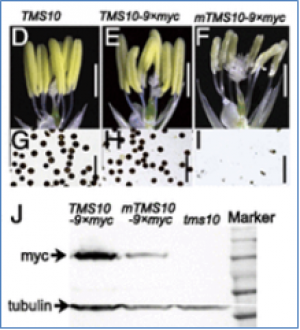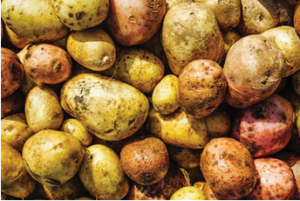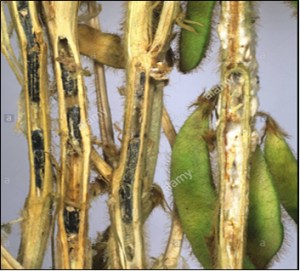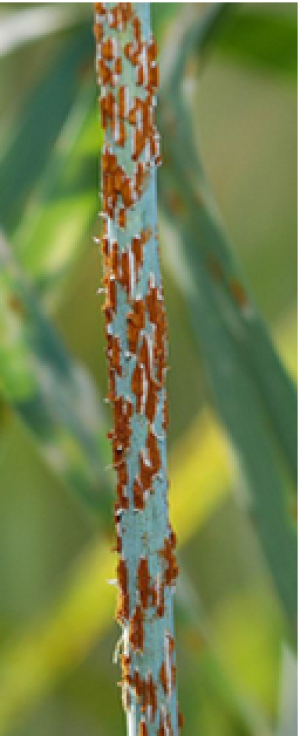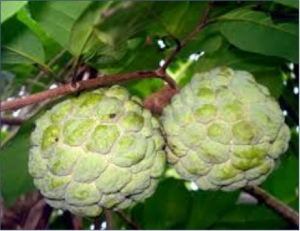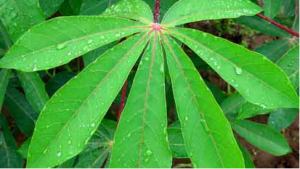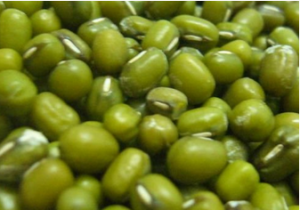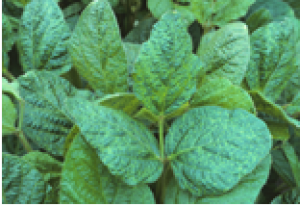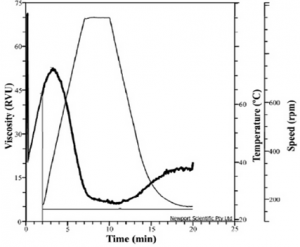By affecting male fertility in crops, climate temperature change has a major impact on global food security. Here we show the role of two rice leucine-rich repeat–receptor-like kinases, TMS10 and TMS10L, which redundantly control male fertility under fluctuating temperatures. This finding provides insights into how plants overcome adversary temperature changes to achieve normal male fertility and a new genetic resource for crop hybrid seed production.
Worldwide, potato is the third most important crop grown for direct human consumption, but breeders have struggled to produce new varieties that outperform those released over a century ago, as evidenced by the most widely grown North American cultivar (Russet Burbank) released in 1876. Despite its importance, potato genetic diversity at the whole-genome level remains largely unexplored.
Sclerotinia Stem Rot (SSR), caused by the fungal pathogen Sclerotinia sclerotiorum, is ubiquitous in cooler climates where soybean crops are grown. Breeding for resistance to SSR remains challenging in crops like soybean, where no single gene provides strong resistance, but instead, multiple genes work together to provide partial resistance. In this study, a genome-wide association study (GWAS) was performed to dissect the complex genetic architecture of soybean quantitative resistance to SSR and to provide effective molecular markers that could be used in breeding programs.
Wheat provides a substantial proportion of the calories and proteins consumed by humans, but further production increases are necessary to feed a growing human population. Reducing yield losses caused by pathogens can contribute to these increases. In this study, we report the identification of Sr13, a gene from pasta wheat that confers resistance to the new virulent races of the stem rust pathogen that appeared in Africa at the beginning of this century.
Sugar apple (Annona squamosa L.), a popular fruit with high medicinal and nutritional properties, is widely cultivated in tropical South Asia and America. The malformed flower is a major cause for a reduction in production of sugar apple. However, little information is available on the differences between normal and malformed flowers of sugar apple.
CRISPR/Cas9 has become a powerful genome-editing tool for introducing genetic changes into crop species. In order to develop capacity for CRISPR/Cas9 technology in the tropical staple cassava (Manihot esculenta), the Phytoene desaturase (MePDS) gene was targeted in two cultivars using constructs carrying gRNAs targeting two sequences within MePDS exon 13. After Agrobacterium-mediated delivery of CRISPR/Cas9 reagents into cassava cells, both constructs induced visible albino phenotypes within cotyledon-stage somatic embryos regenerating on selection medium and the plants regenerated therefrom.
Mungbean is an important pulse crop extensively cultivated in Southeast Asia for supply of easily digestible protein. Salinity severely limits the growth and productivity of mungbean, and weeding poses nutritional and disease constraints to mungbean cultivation. To pyramid both salt tolerance and protection against herbicide in mungbean, the AtNHX1 encoding tonoplast Na+/H+ antiporter from Arabidopsis, and bar gene associated with herbicide resistance were co-expressed through Agrobacterium-mediated transformation.
Soybean mosaic virus (SMV) is a member of Potyvirus genus that causes severe yield loss and destroys seed quality in soybean [Glycine max (L.) Merr.]. It is important to explore new resistance sources and discover new resistance loci to SMV, which will provide insights to improve breeding strategies for SMV resistance. Here, a genome-wide association study was conducted to accelerate molecular breeding for the improvement of resistance to SMV in soybean.
Starch pasting viscosity is an important quality trait in cassava (Manihot esculenta Crantz) cultivars. The aim here was to identify loci and candidate genes associated with the starch pasting viscosity. Quantitative trait loci (QTL) mapping for seven pasting viscosity parameters was carried out using 100 lines of an F1 mapping population from a cross between two cassava cultivars Huay Bong 60 and Hanatee.
Soybean (Glycine max [L.] Merr.) cultivars are generally sensitive to flooding stress. The plant growth is severely affected and grain yield is largely reduced in the flooded field. It is important to develop flood-tolerant soybean cultivars for grain production in regions of heavy rainfalls worldwide. In this study, a total of 722 soybean genotypes were evaluated for flooding tolerance at R1 stages (first flower at any node) in the 5-year flooding screening tests.


 Curently online :
Curently online :
 Total visitors :
Total visitors :
